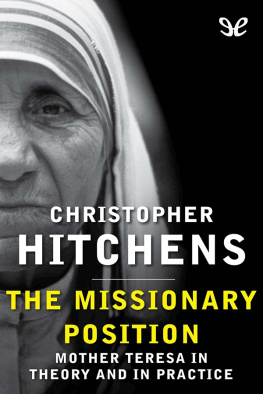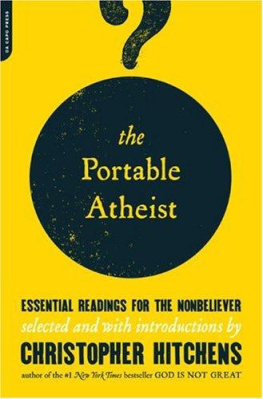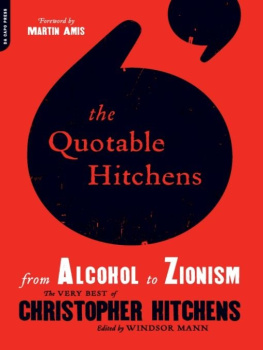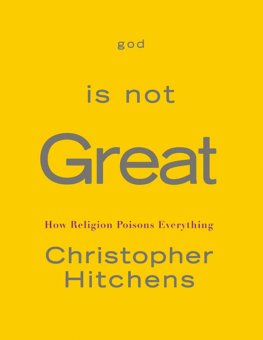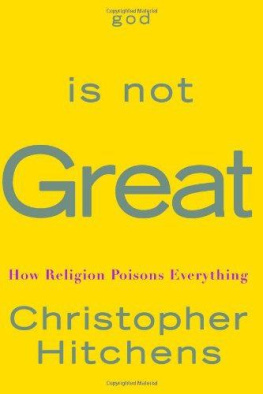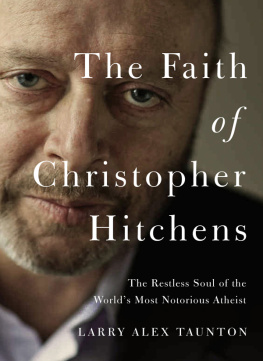Christopher Hitchens - The Missionary Position
Here you can read online Christopher Hitchens - The Missionary Position full text of the book (entire story) in english for free. Download pdf and epub, get meaning, cover and reviews about this ebook. year: 1995, publisher: ePubLibre, genre: Religion. Description of the work, (preface) as well as reviews are available. Best literature library LitArk.com created for fans of good reading and offers a wide selection of genres:
Romance novel
Science fiction
Adventure
Detective
Science
History
Home and family
Prose
Art
Politics
Computer
Non-fiction
Religion
Business
Children
Humor
Choose a favorite category and find really read worthwhile books. Enjoy immersion in the world of imagination, feel the emotions of the characters or learn something new for yourself, make an fascinating discovery.
- Book:The Missionary Position
- Author:
- Publisher:ePubLibre
- Genre:
- Year:1995
- Rating:5 / 5
- Favourites:Add to favourites
- Your mark:
- 100
- 1
- 2
- 3
- 4
- 5
The Missionary Position: summary, description and annotation
We offer to read an annotation, description, summary or preface (depends on what the author of the book "The Missionary Position" wrote himself). If you haven't found the necessary information about the book — write in the comments, we will try to find it.
The Missionary Position — read online for free the complete book (whole text) full work
Below is the text of the book, divided by pages. System saving the place of the last page read, allows you to conveniently read the book "The Missionary Position" online for free, without having to search again every time where you left off. Put a bookmark, and you can go to the page where you finished reading at any time.
Font size:
Interval:
Bookmark:
Who would be so base as to pick on a wizened, shriveled old lady, well stricken in years, who has consecrated her entire life to the needy and the destitute? On the other hand, who would be so incurious as to leave unexamined the influence and motives of a woman who once boasted of operating more than five hundred convents in upward of 105 countries without counting India? Lone self-sacrificing zealot, or chair of a missionary multinational? The scale alters with the perspective, and the perspective alters with the scale.
Once the decision is taken to do without awe and reverence, if only for a moment, the Mother Teresa phenomenon assumes the proportions of the ordinary and even the political. It is part of the combat of ideas and the clash of interpretations, and can make no serious claims to having invisible means of support. The first step, as so often, is the crucial one. It still seems astonishing to me that nobody had ever before decided to look at the saint of Calcutta as if, possibly, the supernatural had nothing to do with it.
I was very much discouraged as I asked the most obvious questions and initiated what were, at the outset, the most perfunctory investigations by almost everybody to whom I spoke. So I must mention several people who gave me heart, and who answered the implied question Is nothing sacred? with a stoical No. Victor Navasky, editor of The Nation, and Graydon Carter, editor of Vanity Fair, both allowed me to write early polemics against Mother Teresa even though they had every reason to expect a hostile reader response (which, interestingly, failed to materialize). In making the Channel Four documentary Hells Angel, which aired in Britain in the autumn of 1994 and which did lead to venomous and irrational attacks, I owe everything to Vania Del Borgo and Tariq Ali of Bandung Productions, whose idea it was, and to Waldemar Januszczak of Channel Four, who took the heat, as the saying goes. A secular Muslim, a secular Jew and a secular Polish Catholic made excellent company in fending off the likes of Ms. Victoria Gillick, a pestilential morals campaigner who stated publicly that our program was a Jewish/Muslim conspiracy against the One True Faith. Colin Robinson and Mike Davis of Verso were unwavering in their belief that a few words are worth many pictures. Ben Metcalf was and is a splendid copy editor.
This is a small episode in an unending argument between those who know they are right and therefore claim the mandate of heaven, and those who suspect that the human race has nothing but the poor candle of reason by which to light its way. So I acknowledge as well the help and counsel and support of three heroes in this battle: Gore Vidal, Salman Rushdie and Israel Shahak. It was once well said, of the criticism of religion, that the critic should pluck the flowers from the chain, not in order that people should wear the chain without consolation but so that they might break the chain and cull the living flower. As fundamental monotheism and shallow cultism testify to one view of the human future, and as the millennium casts its shadow before us, it has been a privilege to soldier with such distinguished witnesses. If the baffled and fearful prehistory of our species ever comes to an end, and if we ever get off of our knees and cull those blooms, there will be no need for smoking altars and forbidding temples with which to honor the freethinking humanists, who scorned to use the fear of death to coerce and flatter the poor.
We believe that taking that kind of position, Charlie, is not a Democrat or Republican issue. We think its an issue of whats moral; its about whats compassionate; its the kind of values that Mother Teresa represents.
Ralph Reed, chairman of Pat Robertsons
Christian Coalition, on Charlie Rose,
21 February 1995
DEAR ANN LANDERS:
Often the simple things in life can make the most difference. For example, when someone asked Mother Teresa how people without money or power can make the world a better place, she replied, They should smile more.
Prince George, B.C.
DEAR PRINCE:
What a splendid response. Thank you.
22 May 1995
Every day, the troubled and the despairing and the bewildered write their humble, nervous letters to the Ann Landers agony column. And every day, they are urged to seek counseling, to talk things over with their ministers, to pull their socks up, to play by the rules and look on the bright side. Most mornings, the jaunty column ends its brisk summary of the conventional wisdom with a Gem of the Day, some fragment of cracker-barrel sapience or wry, Readers Digest-style positive thinking. Recently, the above item was selected as the daily gem. Many Americans, schooled in the national dream of promise and abundance and opportunity, are condemned to experience life as a disappointment and to wonder if the fault is in themselves or in their stars that they are perpetual underlings. If this were not so, Ann Landers would be out of a job in the same way that so many of her readers are. But it is difficult to imagine many losers facing the day with a squarer jaw or a firmer, springier step as a consequence of imbibing this particular piece of counsel over their nutrition-free breakfast cereal. It is also doubtful whether a fortune-cookie maxim of such cretinous condescension would have been chosen even by Ann Landers unless it bore the imprimatur of Mother Teresa, one of the few untouchables in the mental universe of the mediocre and the credulous.
Intellectual snobbery? Only if the task of intellectuals is to urge Mr. and Mrs. Average to settle for little, or for less. Time and again, since I began the project of judging Mother Teresas reputation by her actions and words rather than her actions and words by her reputation, I have been rebuked and admonished for ridiculing the household gods of the simple folk; for sneering at a woman who, to employ an old citation, gives those in the gutter a glimpse of the stars. But is it not here that authentic intellectual snobbery exposes itself? We ourselves are far too sophisticated to believe in God and creationism and all that, say the more advanced defenders of the Teresa cult. But we do believe in religion at least for other people. It is a means of marketing hope, and of instilling ethical precepts on the cheap. It is also a form of discipline. The followers of the late American guru Leo Strauss a man who had a profound influence on the Republican Right wing make this cynical point explicit in their otherwise arcane texts. There should be philosophy and knowledge for the elect, religion and sentimentality for the masses. By a bizarre coincidence of political opportunism, these Straussian forces are today ranged in alliance with the Christian fundamentalist cohort, founded by Pat Robertson but represented in public by the more cosmetic Ralph Reed. As can be seen from the excerpt above, Mr. Reed knows how to use a script when he is in a tight corner. Challenged on his prospectus for a Christian America that cares for people before they are born and after they are dead but is only interested in clerical coercion for the years in between, Mr. Reed immediately reaches for the Gorgons head of Mother Teresa and turns his questioners into stone. This would be even funnier if the Christian Coalition did not have its roots in the most vulgar strain of anti-Catholicism, but as Mother Teresa has shown in her moments with John-Roger and Michle Duvalier, and as her Church has shown in its alliance with mullahs and ayatollahs, there exists a sort of reverse ecumenicism which unites all versions of the faithful against any version of the dreaded secular humanist Enlightenment.
Agnes Bojaxhiu knows perfectly well that she is conscripted by people like Ralph Reed, that she is a fund-raising icon for clerical nationalists in the Balkans, that she has furnished PR-type cover for all manner of cultists and shady businessmen (who are often the same thing), that her face is on vast highway billboards urging the state to take on the responsibility of safeguarding the womb. By no word or gesture has she ever repudiated any of these connections or alliances. Nor has she ever deigned to respond to questions about her friendship with despots. She merely desires to be taken at her own valuation and to be addressed universally as Mother Teresa. Her success is not, therefore, a triumph of humility and simplicity. It is another chapter in a millennial story which stretches back to the superstitious childhood of our species, and which depends on the exploitation of the simple and the humble by the cunning and the single-minded.
Font size:
Interval:
Bookmark:
Similar books «The Missionary Position»
Look at similar books to The Missionary Position. We have selected literature similar in name and meaning in the hope of providing readers with more options to find new, interesting, not yet read works.
Discussion, reviews of the book The Missionary Position and just readers' own opinions. Leave your comments, write what you think about the work, its meaning or the main characters. Specify what exactly you liked and what you didn't like, and why you think so.

